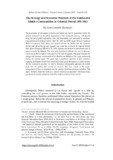Please use this identifier to cite or link to this item:
http://ir-library.mmust.ac.ke:8080/xmlui/handle/123456789/2149Full metadata record
| DC Field | Value | Language |
|---|---|---|
| dc.contributor.author | Muchanga, Kizito Lusambili | - |
| dc.date.accessioned | 2023-01-10T05:46:16Z | - |
| dc.date.available | 2023-01-10T05:46:16Z | - |
| dc.date.issued | 2023-01-01 | - |
| dc.identifier.uri | https://www.athensjournals.gr/history/2023-9-1-4-Muchanga.pdf | - |
| dc.identifier.uri | https://doi.org/10.30958/ajhis.9-1-4 | - |
| dc.identifier.uri | http://ir-library.mmust.ac.ke:8080/xmlui/handle/123456789/2149 | - |
| dc.description.abstract | The penetration of colonialism in Isukha and Idakho can best be understood within the general framework of the global imperialism of the nineteenth century, with Europe being the hub of global imperialism where the imperialists were motivated by economic, humanitarian and strategic factors. After the 1886 and 1890 Anglo-German treaties at Berlin's conference, East Africa was divided between the British and the Germans. British East Africa (Kenya and Uganda) was under the control of the Imperial British East Africa Company (IBEACo). In 1894, Uganda was declared a protectorate and its sphere included the Baluyia. This same year, protectorate officials were sent to Mumias, which was by then a traders' entry-point on the road to Uganda. This paper analyses the ecology and economic environment of the Bisukha and Bidakho of the Luyia community during the colonial epoch. The paper took a qualitative approach to data collection, engaging participants in oral interviews and focused group discussions on understanding the two community practices. In what is termed an ethnographic approach, the author finds that the natives lost control of resources that were crucial in the proper management of their environments and the practice of various economic activities. This paper, therefore, finds that Land as a natural resource was alienated with forests being gazetted and animals confiscated to feed the soldiers of World Wars I and II | en_US |
| dc.language.iso | en | en_US |
| dc.publisher | Athens Journal of History | en_US |
| dc.subject | Ecology , Economic Practices, Isukha ,Idakho Communities, Colonial Period, 1895-1963 | en_US |
| dc.title | The Ecology and Economic Practices of the Isukha and Idakho Communities in Colonial Period 1895-1963 | en_US |
| dc.type | Article | en_US |
| Appears in Collections: | Gold Collection | |
Files in This Item:
| File | Description | Size | Format | |
|---|---|---|---|---|
| 2023-9-1-4-Muchanga-1.pdf | 465.67 kB | Adobe PDF |  View/Open |
Items in DSpace are protected by copyright, with all rights reserved, unless otherwise indicated.
